Are Headaches and Sickness Early Signs of Pregnancy? Discover the Truth
Pregnancy is a beautiful journey filled with excitement, anticipation, and sometimes, discomfort. For many women, the early signs of pregnancy can include a myriad of symptoms, among which headaches and nausea are often reported. Understanding these symptoms is essential for expectant mothers as they navigate their health during this critical time. In this article, we will explore the connection between headaches, nausea, and early signs of pregnancy, providing valuable insights into women’s health and prenatal care.
Understanding Early Pregnancy Symptoms
When it comes to pregnancy symptoms, every woman experiences them differently. Some may notice changes right away, while others might not realize they are pregnant until later on. Among the common early signs of pregnancy, headaches and nausea stand out. Here’s a comprehensive look at these symptoms:
- Headaches: Many women experience headaches during early pregnancy due to hormonal changes, increased blood volume, and other physiological adjustments.
- Nausea: Often referred to as “morning sickness,” nausea can occur at any time of day and is primarily attributed to hormonal fluctuations.
Are Headaches and Nausea Common in Early Pregnancy?
Yes, headaches and nausea are relatively common among expectant mothers. Understanding the causes behind these symptoms can help women manage their health better:
- Hormonal Changes: During early pregnancy, the body undergoes significant hormonal shifts, particularly in estrogen and progesterone levels, which can trigger headaches.
- Increased Sensitivity: Pregnant women may experience increased sensitivity to stimuli, leading to headaches.
- Dehydration: Nausea can lead to decreased fluid intake, which may contribute to headaches.
How to Differentiate Between Normal Symptoms and Concerns
While headaches and nausea can be normal pregnancy symptoms, it is essential to recognize when they may indicate a more serious issue. Here are some indicators to watch for:
- If headaches are severe and persistent, consult a healthcare provider.
- Severe nausea that prevents eating or drinking may require medical attention to avoid dehydration.
- If headaches are accompanied by blurred vision, swelling, or sudden weight gain, it’s crucial to seek immediate care.
Step-by-Step Guide to Managing Headaches and Nausea During Early Pregnancy
Managing headaches and nausea in early pregnancy is vital for the well-being of expectant mothers. Here’s a guide to help alleviate these symptoms:
Managing Headaches
- Stay Hydrated: Drink plenty of water throughout the day to prevent dehydration, which can trigger headaches.
- Rest: Ensure you get enough sleep and take breaks when feeling fatigued.
- Practice Relaxation Techniques: Consider yoga, meditation, or deep-breathing exercises to reduce stress.
- Cold Compress: Applying a cold compress on the forehead may provide relief.
- Consult a Healthcare Provider: If headaches persist, consult your doctor for appropriate pain relief options.
Managing Nausea
- Eat Small, Frequent Meals: Consuming smaller meals throughout the day can help manage nausea and keep blood sugar stable.
- Stay Hydrated: Sipping clear fluids can alleviate nausea. Consider ginger tea or lemonade, which may settle the stomach.
- Avoid Triggers: Identify and avoid foods or smells that trigger nausea.
- Vitamin B6: Some studies suggest that vitamin B6 may help reduce nausea. Consult your healthcare provider before starting any supplements.
- Talk to Your Doctor: If nausea is severe, your healthcare provider may prescribe medication to help manage it.
When to Seek Medical Attention
While headaches and nausea can be common during early pregnancy, there are certain situations where it is crucial to seek medical attention:
- If you experience severe abdominal pain.
- If headaches are accompanied by visual disturbances or severe high blood pressure.
- If nausea leads to significant weight loss or inability to keep food down.
The Importance of Prenatal Care
Regular prenatal care is essential for monitoring the health of both the expectant mother and the developing baby. Here’s why:
- Monitoring Symptoms: Regular check-ups allow healthcare providers to monitor pregnancy symptoms, including headaches and nausea, and provide appropriate interventions.
- Education: Prenatal visits offer valuable education on managing pregnancy symptoms and understanding bodily changes.
- Preparation for Labor: Prenatal care prepares expectant mothers for labor and delivery, ensuring they are informed and ready for the journey ahead.
For more information on prenatal care, visit this resource that provides comprehensive insights into the importance of regular check-ups during pregnancy.
Common Myths About Headaches and Nausea in Pregnancy
There are several myths surrounding headaches, nausea, and pregnancy. Here are a few common misconceptions:
- Myth: All headaches during pregnancy are dangerous.
Fact: While some headaches can indicate a problem, many are harmless and linked to hormonal changes. - Myth: Nausea only occurs in the morning.
Fact: Nausea can happen at any time of day, and it varies greatly among women.
Conclusion
In conclusion, headaches and nausea can indeed be early signs of pregnancy. Understanding these pregnancy symptoms is vital for expectant mothers as they navigate their health and prepare for the arrival of their little one. By managing these symptoms effectively and seeking regular prenatal care, women can ensure a healthier, more comfortable pregnancy. If you are experiencing severe symptoms or have concerns about your health during pregnancy, don’t hesitate to reach out to your healthcare provider for guidance. Remember, your health and well-being are paramount during this beautiful journey of motherhood.
For further reading on women’s health during pregnancy, check out this article that covers essential tips for expectant mothers.
This article is in the category Pregnancy and created by PregnancyBabyCare Team
